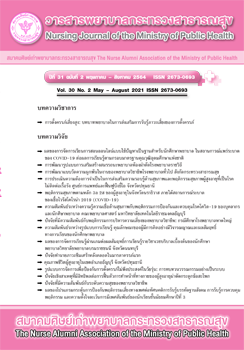Effects of Game – Based Learning on Learning Achievement in Primary Medical Care among Nurse Students, Boromarajonani Collage of Nursing, Nonthaburi Province
Main Article Content
Abstract
This quasi–experimental research aimed to: 1) compare learning achievement in primary medical care before and after Game-Based Learning, and 2) study the satisfaction with Game-Based Learning. The target population were 163 final year nursing students at Boromarajonani College of Nursing, Changwat Nonthaburi. The research instruments were: 1) teaching documents in primary medical care, 2) a card game about primary medical care. The tools used in this research were: 1) the questionnaire of primary medical care, 2) the questionnaire on student satisfaction towards Game-Based Learning. Statistical analyses were descriptive statistics and the dependent t-test. The research results showed that learning achievements of the target population were statistically significant difference at a level of .05. The students were satisfied with Game-Based Learning at a high level (Mean=3.60, SD=.56)
Article Details
บทความและรายงานวิจัยในวารสารพยาบาลกระทรวงสาธารณสุข เป็นความคิดเห็นของ ผู้เขียน มิใช่ของคณะผู้จัดทำ และมิใช่ความรับผิดชอบของสมาคมศิษย์เก่าพยาบาลกระทรวงสาธารณสุข ซึ่งสามารถนำไปอ้างอิงได้
References
2. Prachuablarp C. Game-Based Learning. Journal of Nursing Division.2016;43(2):127-36.(in Thai).
3. Lertwittayakul T. Formative evaluation of learning by Game Based. CAS Journal.2017;7:104–16.(in Thai).
4. Phanichsiti S, Thipphayasaeng P, Chimpleenapanont A, Bangbai S, Tian-nava P. A study of learning achievement of a game-based learning in computer network subject, by using Cisco aspire networking academy edition. RMUTSB Acad. J. (Humanities and Social Sciences). 2017;2(1):79–89.(in Thai).
5. Kumkliang N, Kositchaivat S. The development of learning packages focusing on Computer-based games. Veridian E-Journal, Silpakorn University. 2016;10(1):1865–83.(in Thai).
6. Tisana Khemmani. Teaching Science: Knowledge for organizing effective learning processes 2017. Bangkok: Chulalongkorn university publishing house.(in Thai).
7. Thongmullek T, Vichitthamaros P. A study of factors affecting acceptance and use of social network of people in Thailand. JCOSCI.2017;5(2):114–24.(in Thai).
8. Dankham C, Teemaungsai S, Simmatun P. The study Of bachelor degree undergraduates’ learning be havior, Rajabphat Maha Sarakham University, JNC.2016;10(1):23–31.(in Thai).
9. Jongmuenwai B, Kongsrima K, Prachai S, Jabjone S. Suikraduan, A. Gemification for learning. Project Journal.2018;4(2):34–43.(in Thai).
10. Chotirut S. Blended learning approach and motivating in learning by integrated gemification in data structure and algorithm course, ASJ-PSU. 2019;30(2):69–79.(in Thai).
11. Sittiwong T. The effects of using 3-dimensional educational game (competition type) to enhance self-learning in science subject area for lower secondary level, edujournal.nu.2020;22(1):59–71.(in Thai).
12. Pantheepo H, Bowjai P, Vate-U-Lan P. Development of an e-learning based on an online personal learning environment through social networks on patient transfer, Faculty of education, SWU.2017;11(2):144-9.(in Thai).

